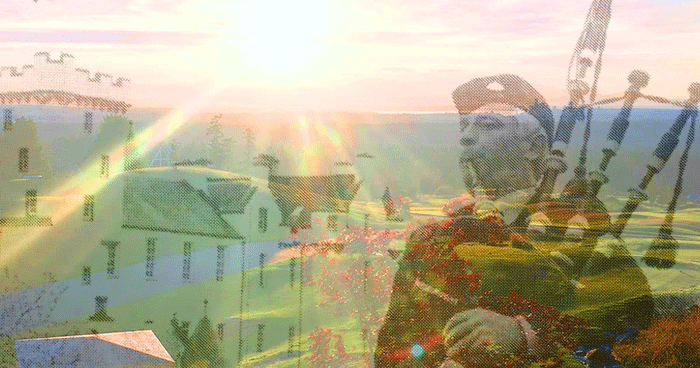
This reader contacted us after we published the article from Scotland’s History magazine ‘The Meaning of Bagpipe Music on the Western Front During WW1‘
My name is Robyn M Pio. I am a 70-year-old American woman raised by a German great-grandmother (who was born in Bremen, 1878). I now live in Chicago, Illinois, but my first language was German. I became a Catholic Francophile whilst living in France years ago. I am retired, but do volunteer work as an artist.
So this comes from someone who is not a Scot, nor with any deep awareness of Scottish history, yet I am so compelled to testify about the power of the sounds from your bagpipes.
It is not an instrument that makes music to merely entertain, or convey a simple, or complex emotion. I do not listen to bagpipes for relaxation or entertainment.
However, when feeling depressed or anxiety torn, there is no method of sound making that can so engage the listener – and transform the very mood or mode one is in, as the rousing sounds of the pipes.
The very timbre of the music allows for no ignoring of the tsunami of energy that is rolling through. All negative, alienating, emotions are simply steam-rollered, and one finds a proper wind in taking up one’s responsibility – whether arising from a grief, or recovering from a fall.
One returns to the bloodstream of the living – even if it is only to meet one’s final test. I do not know who invented the bagpipes, or how long it takes to master the skill of handling them, but I do recognise, far removed from the Scottish language and culture, that there is a miraculous transformative grace channelled by those who can do it well. Thank you for reading this note.
[wds id=”2″]
















Yes, Ms. Pio is correct. When a group of Bagpipes skirls, the rousing sound of the drones and the first “E” are really exciting.
That’s why we, in Hong Kong, is keeping the circle tight by going to the country side yesterday to let our Bagpipes breath.
Whilst I appreciate the comments on the writers reasons or liking the pipes I maintain that the sound depict a cultural significance and the opportunity to enjoy a craftsman or woman displaying their skills
What a marvelously stated sentiment from Ms. Pio. She relates well what we pipers and/or band members hear often. I also appreciated some phrases, including “those who can do it well.” We do not have to be open players, just competent to honor what we do. And most of us know the times we cringe at the massacre of pipes, giving the false impression of what our instrument and music can generate when done properly…those emotions so well expressed by Ms. Pio.
I describe in my book that what we do relates to “connections”. And in Ms. Pio’s lovely note, she underscores that the connection transcends ethical and cultural boundaries.
No other instrument comes near the sound of a well tuned and well played highland bagpipe that effects us in such a positive way